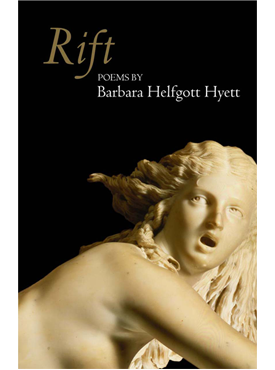Barbara Helfgott Hyett’s new collection considers, from close and afar, the elemental forces coming to bear on human character in our time. In one sense a personal explication of a long marriage and its betrayal, these stunning poems take solace in nature’s steadfastness, and in the prospect of a newly resilient self, awakened to the predicament of a battered world.
The title poem spills across the face of history—9/11, Hiroshima, the harrowing geological formation of earth, the sudden appearance of cave art, and ultimately, the uncertainty of God. The Daphne and Apollo sequence invents fourteen speakers, including a chisel, a river god, the sculptor, Bernini, and the poet, Ovid, each telling his own story as together they deconstruct the longstanding myth of lust gone awry. Such is the imaginative, kaleidoscopic process of Rift, in which acts of observation shatter and shift our view of experience.
While we ache for the loss in these poems, Helfgott Hyett risks such honest grief that redemption comes, free standing and moral, on its own.
Barbara Helfgott Hyett is a cofounder of the Writer’s Room of Boston and is currently the director of POEMWORKS: The Workshop for Publishing Poets. She has taught at Boston University, MIT, and Harvard University. The author of four collections of poetry including The Tracks We Leave, Poems on Endangered Wildlife of North America, and The Double Reckoning of Christopher Columbus, she has worked as a visiting poet in schools all over Massachusetts. Her programs with students, teachers, and families include reading and writing workshops in childhood memory, parenting, and watchfulness.
“Barbara Helfgott Hyett’s poems reflect both her anguish and her fervor; their warmth elevates the reader to spiritual heights.”
—Elie Wiesel, Nobel Laureate and author of Night
“Helfgott Hyett’s poems about love, infidelity and the body in all its guises are tough, tender, and juicy.”
—Maxine Kumin, author of Still to Mow, Poems
“Barbara Helfgott Hyett’s Rift is a book born of acute psychic necessity and there is not a trifle or bauble in it. . . . Faced with the annihilation of the life she has known, Helfgott Hyett employs her imagination, her learning, and her poetic virtuosity to search among biblical and mythic narratives, arctic expeditions, memories, meteor showers, classical and romantic art, and history for a way forward. This book is that way, a profound gift to all of us. The title sequence is itself a major work, a rich, polyvocal, unflinching vision of the world we live in now.”
—Richard Hoffman, author of Half the House, Without Paradise, and Gold Star Road
“Helfgott Hyett takes up the theme of loss, specifically the break-up of a long marriage, in poems that are direct and detailed, with a power rooted in restraint and compression. Her imagery is clear and often surprising, as in these opening lines: ‘He rises slowly, so as/ not to wake her. An ox is/ that careful as it tears the grasses . . . ’ She captures each moment with precision, her ear for dialogue unerring, as in these lines: ‘She lay her face on his thighs./ . . . He patted her hair/ . . . Poor you, he told the top of her head./His boat shoes were tapping/the cabinet. It was all/he could do not to run.’ These poems, wrung from grief, anger, and disillusionment, return again and again to an affirmation of the hard work of living.”
—Ellen Bass, author of Courage to Heal and The Human Line

